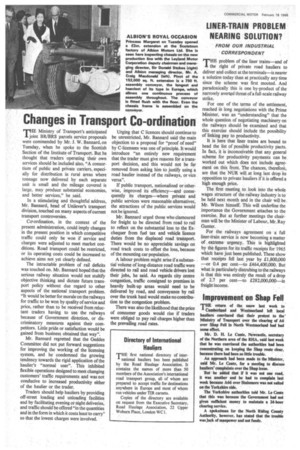Changes in Transport Co-ordination
Page 26

If you've noticed an error in this article please click here to report it so we can fix it.
irHE Ministry of Transport's anticipated 1 joint BR/RS parcels service proposals were commended by Mr. J. W. Bannard, on Tuesday, when he spoke to the Scottish Section of the Institute of Transport. But he thought that traders operating their own services should be included also. "A consortium of public and private carriers, especially for distribution in rural areas where tonnage now delivered by each separate unit is small and the mileage covered is large, may produce substantial economies, and better services," he said.
In a stimulating and thoughtful address, Mr. Bannard, head of Unilever's transport division, touched on many aspects of current transport controversies.
Cotordination, in the context of the present administration, could imply changes in the present position in which competitive traffic could only be won if service and charges were adjusted to meet market conditions. Road transport could be restricted, or its operating costs could be increased to achieve aims not yet clearly defined.
The intractable problem of rail deficits was touched on. Mr. Bannard hoped that the serious railway situation would not stultify objective thinking and dictate future transport policy without due regard to other aspects of the national transport problem. "It would be better for morale on the railways for traffic to be won by quality of service and price, rather than to be received from reluctant traders having to use the railways because of Government direction, or discriminatory measures against their competitors. Little pride or satisfaction would be gained from business obtained that way".
Mr. Bonnard regretted that the Geddes Committee did not put forward suggestions for improving the working of the licensing system, and he condemned the growing tendency towards the rigid application of the haulier's "normal user". This inhibited flexible operations designed to meet changing customers' traffic requirements and was not conducive to increased productivity either of the haulier or the trader.
Traders should help hauliers by providing off-street loading and unloading facilities and by facilitating evening or night deliveries, and traffic should be offered "in the quantities and in the form in which it costs least to carry' so that the lowest charges were involved. Urging that C licences should continue to be unrestricted, Mr. Bannard said the main objection to a proposal for "proof of need" by C-licensees was one of principle. It would introduce "an entirely new requirement that the trader must give reasons for a transport decision, and this would not be far removed from asking him to justify using a road haulier instead of the railways, or vice versa".
If public transport, nationalized or otherwise, improved its efficiency—and consequently its charges—where private and public services were reasonable alternatives, the attractions of the public services would not be ignored.
Mr. Bannard urged those who clamoured for freight to be directed from road to rail to reflect on the substantial loss to the Exchequer from fuel tax and vehicle licence duties from the displaced road transport. There would be no appreciable savings on road track costs to offset the loss, because of the mounting car population.
A labour problem might arise if a substantial volume of long-distance road traffic were directed to rail and road vehicle drivers lost their jobs, he said. As regards city centre congestion, traffic consigned to premises in heavily built-up areas would need to be delivered by road, and conveyance by rail over the trunk haul would make no contribution to the congestion problem.
There was also the likelihood that the price of consumer goods would rise if traders were obliged to pay rail charges higher than the prevailing road rates.




















































































































